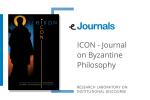
The modern online environment of the eBooks platform developed by the National Documentation Centre (EKT), is being used by the National Centre for Social Research (EKKE) to publish six new books on cutting-edge social science topics. To date, the eBooks platform, which is designed for the research and academic community of the country, hosts 6 publishing houses in its online environment and offers its visitors access to the content of 16 books/monographs.
EKKE is intensely active in print and digital publications. These publications reflect research approaches and analysis of aspects of modern Greek society, and are often used as teaching material in the country's universities. Visit the EKKE publishing house: study the conditions of the emergence of the new artistic wave that appeared in Greek cinema in 2009, examine the contribution of the 'Brooklides' (Returnees) to the economic, social and cultural transformation of their communities of origin, explore the role of neo-institutional theories in the interpretation of political phenomena. In the EKKE publishing house you can also read books that study the evolution of left pedagogical thought in Greece (1910-1951), the aspects of civil society in Thessaloniki during the first years of the crisis (from 2010 to 2014) and the impact of the European Union (EU) on the domestic institutions of local and regional government.
The book by Irini Sifaki, Anastasia Stamou and Maria Papadopoulou, titled "The Emergence of a New Wave in Contemporary Greek cinema: Processes of artistic production, legitimisation and communication in the art world", refers to the creation and conditions for the emergence of a dynamic and pioneering artistic phenomenon that appears around 2009 and is associated with a generation of talented Greek directors and independent filmmakers.The New Wave or'Greek Weird Wave' (as it first became known in the press), although born in a time of domestic economic and social crisis, has managed to travel to and excel in recognised festivals abroad and arouse the interest of journalists, researchers and cultural administrators at international level.
What factors contributed and/or favoured its emergence? How did critical and scientific discourse influence its cultural evaluation and establishment in the art world? How did the following communication practices and strategies contribute to its formation and promotion? These and a number of other interesting topics are discussed in the EKKE book.
"The Returnees: Greek Immigrants in United States and the transformations of origin communities,1890–1940" by Giota Tourgeli examines the contribution of the 'Brooklides', ie the Greeks who immigrated to the United States of America, in the economic, social and cultural transformation of their communities of origin from the end of the 19th century until the Second World War. It highlights the ways and means, as well as the sectors and the extent to which rural populations in Greek villages communicated with their migrant communities and were also influenced by their transatlantic mobility and by economic, material and cultural flows. Drawing on the growing academic literature on 'transnational social fields' and 'social remittances' it describes the transnational social space which was created between Greek agrarian provinces and American cities through translocal contacts and transborder exchanges maintained by migrants and non-migrants and facilitated by social networks, hometown associations and the technology of the era.
The book "Neo-institutional approaches and primary research: The case study of EQUAL and LEADER local partnerships in Crete" by Despina Grigoriadou acknowledges and develops the role of neo-institutional theories in understanding and interpreting political phenomena. In particular, this neo-institutional study analyses the dynamic interaction between formal/informal rules and the behaviour of subjects operating in a political institution, examining through primary research onlocal partnerships in Greece. The theoretical assumptions of this analysis derive mainly from normative neo-institutionalism but also include insights from rational choice and the historical institutionalism. Consideration is also given to sociological theories of the structure/agent duality along with concepts and empirical observations from the literature on urban governance, urban regimes, Europeanisation and political leadership.
This interdisciplinary analysis stems epistemologically from the critical realism stance which acknowledges a reflexive approach to reality. This was also integrated into the research methodology with the implementation of an embedded case study strategy. The case study consists of two local partnerships in the region of Crete, which were established under the EU Community Initiatives Programmes EQUAL II and LEADER+ and coordinated by the Local Development Agency of Heraklion.
"Left pedagogical thought in Greece (1910-1951). From the liberal progressive education to the polytechnism" by Eleftheria Papastefanaki concerns the investigation of the process of birth and evolution of left pedagogical thought in Greece.This process was based firstly on the course of development and the action of the Educational Association and secondly on the course of development of the communist movement in the country.An important moment for the birth of left-wing pedagogical thinking will be the split of the Educational Association in 1927 and the announcement of the Association's governing committee after its critical meetings.
Besides the above process, the birth and consolidation of KKE (Communist Party of Greece) will allow the emergence of a new qualitative political proposal and the formulation of an educational discourse inspired by pedagogical theory and practice in USSR. The 1940s and the Occupation and Civil War period will allow left educators to partially implement their pedagogical proposals in the context of left political power. Under particular circumstances, the vision of a 'New Greece' under the general title of 'Reconstruction' will include educational plans in a wider post-war rebuilding plan of the country. The culmination of this process will be the work of Antaios Journal.
"Τhe form and gender of civil society in Greece during the first years of the crisis"
The study "Τhe form and gender of civil society in Greece during the first years of the crisis" by Katerina Loukidou explores aspects of civil society in Greece during the first years of the crisis i.e. the years between 2010-2014. This period begins with an organizational proliferation and an explosion of citizen’s demands and ends shortly before SYRIZA's rise to power. It uses the type and gender of the organizations as main axis of analysis, highlighting the importance for the organization’s function and relationship towards the state.
Through quantitative research and personal interviews with members of formal and informal organisations which managed requests during that period, the study points out two basic transformations in the civil society of Thessaloniki.The first is the formation of anti-hegemonies, expressed by the spread of informal organisation.The second transformation is the high participation of women in organisations during the reporting period.
"Μulti-level Governance in the European Union and in Greece"
The study "Multilevel governance in the European Union and Greece" by George Economou attempts to address the issue of the dual impact of the European Union (EU) on domestic local and regional government institutions: on the one hand as a pressure factor for adjustment, on the other as scope for offering subnational mobilisation opportunities. In particular, it investigates the extent to which the direct and unmediated mobilisation of Greek local and regional institutions in the EU has developed as a result of successive reform initiatives, which, chronologically, began in the second half of the 1980s with a view to decentralisation.
EKT's publishing co-operation with EKKE
The eBooks platform is part of the EKT ePublishing service, which contributes decisively to the digital transformation of the scientific publishing activity in Greece and strengthens scholarly communication. The EKT ePublishing service consists of three platforms for publishing journals, conference proceeding and books. These platforms host the content of each publisher (journals, monographs, conference proceedings) and enable it to co-exist with other reputable publishers.
In its partnership with EKKE, EKT provides the infrastructure for the electronic publication of books, through its eBooks platform, while EKKE conducts the scientific supervision of the content.
With two other books ,"Public policy, public utility and citizens: The impact of privatisation" by Mantos Lambropoulou, and "Constructing gendered identities: the rhetorics of gender in the NGO’s volunteers’ talk about sex trafficking" by Maki Kostoula already, already on the eBooks platform, the publishing co-operation between EKT and EKKE is set to further expand.
In collaboration with EKT, EKKE also publishes electronically “The Greek Review of Social Research” a scientific journal that has been published since 1969 and which hosts pioneering ideas and research of many scientists covering a wide range of basic and applied social research. The journal archive, which is available on the eJournals platform, includes more than 132 issues. More information on the history, editorial team, peer review procedures and content of the journal is available on the eJournals platform.
















